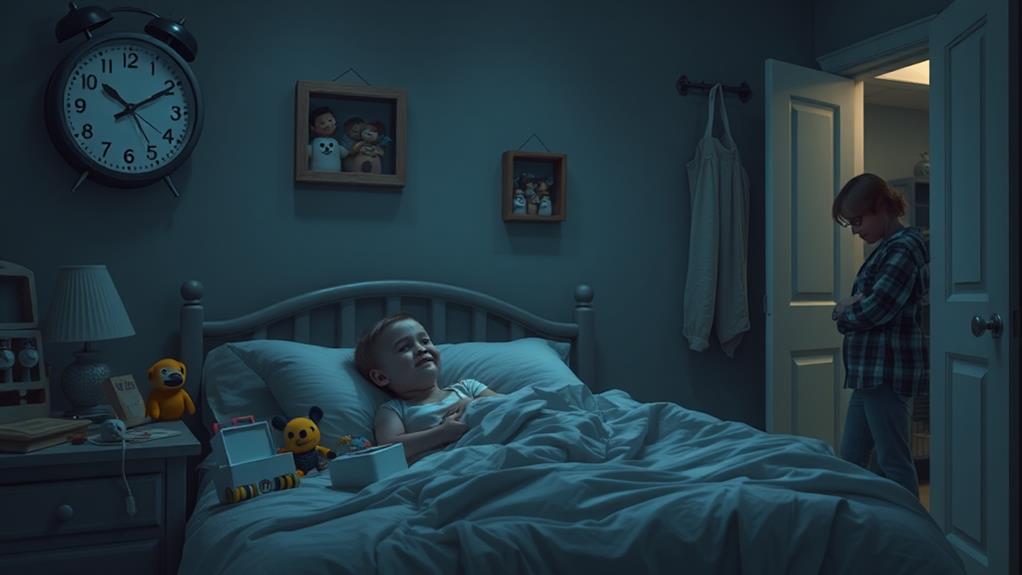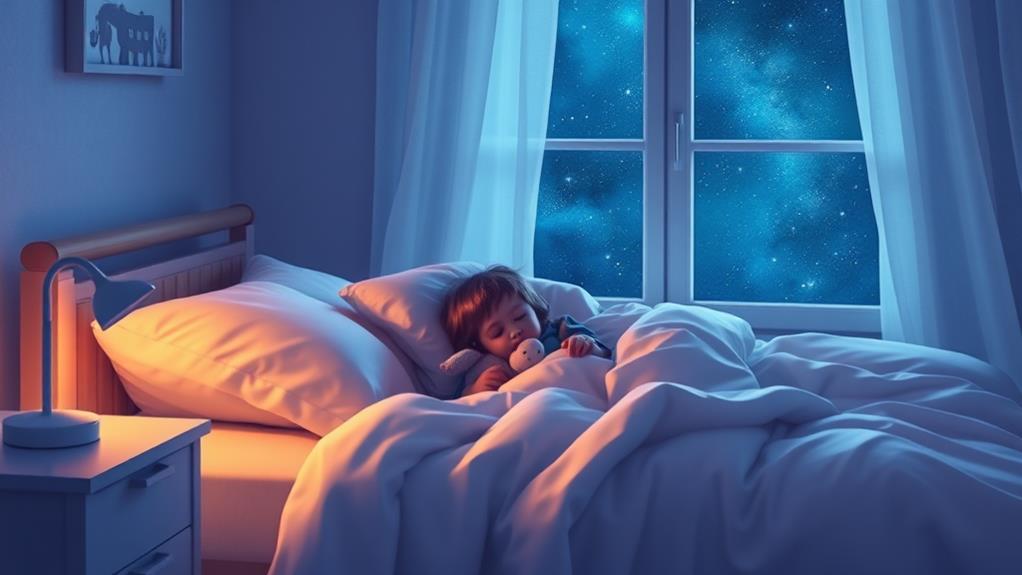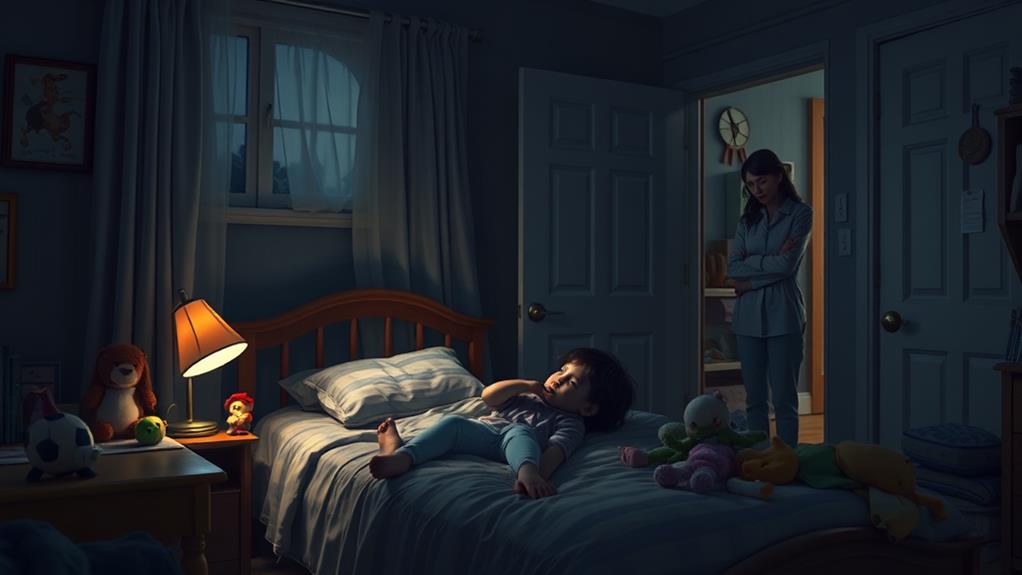Sleep Disorders in Children: Types, Symptoms, and Solutions
When it comes to sleep disorders in children, you might be surprised by the variety of issues that can arise, from insomnia to sleep apnea. You'll notice symptoms like daytime irritability or trouble focusing, which can disrupt not just their rest but also their daily life. Understanding these disorders is essential, as it opens the door to effective solutions. But what practical steps can you take to help your child achieve a better night's sleep? The answer might be more straightforward than you think, yet it requires careful consideration of several factors.
Common Types of Sleep Disorders

When it comes to sleep disorders in children, several common types can affect their overall health and development. You might've heard of insomnia, where your child struggles to fall asleep or stay asleep. It's like they've got a secret mission to avoid dreamland!
Then there's sleep apnea, which sounds fancy but just means your child might stop breathing for short moments while they sleep. This can leave them feeling like they've run a marathon instead of resting.
Another common issue is restless legs syndrome, where your child feels an urge to move their legs, making it tough for them to settle down. It's like having a dance party when they should be snoozing!
Finally, there's night terrors, which can be quite scary. Your child might suddenly wake up, looking terrified and confused, but they usually won't remember it in the morning.
Understanding these sleep disorders is the first step toward helping your child get the restful sleep they need. And let's be honest—who doesn't want a well-rested child?
Recognizing Symptoms in Children
Recognizing symptoms of sleep disorders in children is essential for ensuring they get the rest they need. If your child seems extra cranky during the day, it might be more than just a case of the grumps.
Look for signs like difficulty falling asleep, frequent nightmares, or even trouble waking up in the morning. If they're tossing and turning, or if you hear unusual noises like snoring or gasping, these could be red flags.
You might notice your child is a bit more forgetful or has trouble concentrating in school. Sleep-deprived kids can be like walking zombies—just without the moaning! Sometimes, they may even have an increase in hyperactivity or behavior issues.
Pay attention to how they act after a night's sleep. If they're still tired or need extra naps, that's not a good sign.
It's important to talk to your child about their sleep habits, too. Ask them if they feel rested or if something's bothering them at bedtime.
Impact on Daily Life

Sleep disorders can considerably disrupt a child's daily life, affecting everything from their mood to their academic performance. Imagine trying to pay attention in class when you're yawning every five minutes!
Kids with sleep problems often feel cranky or moody, which can make it tough to get along with friends and family. You might notice your child being a bit more sensitive or quick to anger, and that's not fun for anyone.
Academically, sleep disorders can slow down your child's learning. If they're not getting enough rest, concentrating on homework or tests can feel like climbing a mountain with a heavy backpack. It's hard to remember what you studied when your brain is foggy from lack of sleep!
Physical activities can also suffer. When your child feels tired, they mightn't want to run outside or join in on games. Instead, they might just want to curl up on the couch.
Effective Treatment Options
Several effective treatment options can help address sleep disorders in children. First, it's important to understand the specific sleep issue your child is facing. For instance, if your child has trouble falling asleep, a bedtime routine might be just what they need. Think of it as a cozy ritual that signals it's time to wind down.
Another option is cognitive-behavioral therapy, or CBT, which can help change negative thoughts about sleep. Don't worry; it's not as scary as it sounds! A trained therapist can guide your child through relaxation techniques or gentle breathing exercises.
Sometimes, simple adjustments in your child's environment can work wonders. Make their bedroom a sleep-friendly space by keeping it dark, cool, and quiet. You might even want to ban those pesky screens before bed—no more late-night video games!
If you find that these methods aren't enough, consulting a pediatrician or sleep specialist can provide additional support. They may suggest sleep studies or medications, if necessary.
Tips for Better Sleep

Creating a sleep-friendly environment is key to helping your child get better rest. Start by making sure their bedroom is dark, quiet, and cool. You can use blackout curtains to block out light and white noise machines or soft music to drown out any distracting sounds. A comfy mattress and pillows are essential too—think of them as a cozy cloud where dreams can happen!
Next, establish a bedtime routine. Kids thrive on consistency, so winding down each night at the same time helps signal that it's time to sleep. Try reading a story together or practicing some deep breathing exercises. You could even create a fun "sleepy time" playlist to set the mood.
Limit screen time before bed, too. Those bright screens can trick your child's brain into thinking it's still daytime. Instead, encourage activities like drawing or puzzles that don't involve screens.
Lastly, keep an eye on their diet. Avoid sugary snacks close to bedtime, and offer calming drinks like warm milk.
With these tips, you'll be well on your way to helping your child enjoy sweet dreams and wake up refreshed, ready to tackle the day!











Post Comment